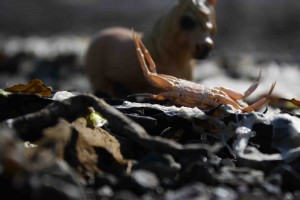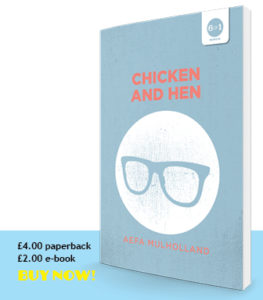 It’s early evening, and Manuel, a local lawyer friend, has met me at the Duke of Perth, one of Chicago’s two Scottish bars. It’s famed for its weekly All You Can Eat Fish and Chips. On our way to the beer garden, we pass a once mighty stag’s head on the wall. The addition of a Strathclyde Police cap makes it look decidedly less dramatic and somehow strangely like actor Robert Carlyle. Staff t-shirts mimic an old milk marketing campaign and query, “Got Scotch?” Outside, everyone is tearing into overloaded plates of thickly battered fish and chips. The drinks list has single malt flights and ales, including those from “Englandshire, a small county to the south of Scotland”. Our Southern neighbour finally put in her place. Menu highlights include the Cajun-Scottish fusion of Lochinver Fish Po-boy, the Ghillie’s Meatloaf, Haggis Wings with hot or BBQ sauce, a nod to Scotland’s national rugby stadium in the form of a Murrayfield mac, plus a “wee mac” for any urchins. There is the rather unappealing concept of a Scotch Egg Burger—a squished and battered egg and sausage burger that is right at home here in the cradle of the McDonald’s empire.
It’s early evening, and Manuel, a local lawyer friend, has met me at the Duke of Perth, one of Chicago’s two Scottish bars. It’s famed for its weekly All You Can Eat Fish and Chips. On our way to the beer garden, we pass a once mighty stag’s head on the wall. The addition of a Strathclyde Police cap makes it look decidedly less dramatic and somehow strangely like actor Robert Carlyle. Staff t-shirts mimic an old milk marketing campaign and query, “Got Scotch?” Outside, everyone is tearing into overloaded plates of thickly battered fish and chips. The drinks list has single malt flights and ales, including those from “Englandshire, a small county to the south of Scotland”. Our Southern neighbour finally put in her place. Menu highlights include the Cajun-Scottish fusion of Lochinver Fish Po-boy, the Ghillie’s Meatloaf, Haggis Wings with hot or BBQ sauce, a nod to Scotland’s national rugby stadium in the form of a Murrayfield mac, plus a “wee mac” for any urchins. There is the rather unappealing concept of a Scotch Egg Burger—a squished and battered egg and sausage burger that is right at home here in the cradle of the McDonald’s empire.
The menu also offers Hebridean Leek Pie. I hadn’t realized leeks were a major crop on the outer isles. The summer my family spent on Eriskay, a tiny wee wind-whipped dot of an island at the southern tail of the Outer Hebrides, it seemed to me that the main Hebridean crops were rain, whisky and kelp. I don’t believe I consumed a single leek that summer. Meanwhile, the rain won no fans, my dad was in favour of the whisky and my mum was enthusiastic enough about the seaweed to add chocolate and boil it up into a disconcertingly putty-like dessert that we all made valiant, but ultimately unsuccessful, efforts to consume.
I was seven when we went to Eriskay and my strongest memory of the island, other than how long it took to chew each lovingly made tentacle of dessert, is what happened immediately after I promised my parents that I wouldn’t stray off the planks that lead the way through the island’s patches of bog. Of course, the minute I was out of sight of the house, I tested the waters, as it were, to see what would happen if I didn’t walk on the planks. I sunk impressively quickly. The peaty muck rose to my middle before I managed to grab and cling onto the plank that had been placed at that spot expressly to prevent such scenarios. But I wasn’t too worried. My parents would soon save me. Help would come. My mum had given us all whistles to blow if we needed her whilst we explored. I blew and blew and blew and was getting quite exasperated when a shadow finally fell. I looked up expecting to see a concerned parent bursting with worry and sympathy, and was extremely surprised to see a petite three-foot-high pony looming above me. I was delighted that my whistle had summoned such an unlikely saviour! This would be a splendid story to tell the others! It was just like in the Scottish fairytales I read where kindly animals came to the rescue of Scottish children who had inconveniently scampered into the path of misfortune. I held my hand up to pat the helpful creature to thank it for its assistance. The wee scunner promptly bit me and trotted off, whinnying in an evil manner. Then I remembered Scots writer Mollie Hunter’s tales of the kelpie—the evil water sprite that took the form of a horse to lure foolish humans to their doom. The whinny sounded again, hooves were coming closer. Sheer terror gave me the strength to clamber onto the plank, leaving one welly boot behind. I dashed the hundred yards home.
My parents seemed remarkably unconcerned about my narrow escape from the demonic horse, no matter how many times I increased the pony’s girth and dental dimensions. In fact, it seemed to rather amuse them. Their amusement only got worse when the stupid wee beast cantered meekly up to the house looking for carrots, thistles or whatever it is that satanic three-foot ponies eat when they’re not feasting on the blood of seven-year-olds.
As a result, the Hebrides do not make me think of leeks.





Comments are closed.